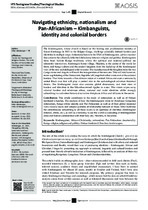Navigating ethnicity, nationalism and Pan-Africanism – Kimbanguists, identity and colonial borders
Abstract
The Kimbanguists, whose church is based on the healing and proclamation ministry of
Simon Kimbangu in 1921 in the Belgian Congo, challenge colonially defined borders and
identities in multiple ways. Anticolonialism is in the DNA of Kimbanguism, yet in a manner
that contests the colonially inherited dichotomy between religion and politics. Kimbanguists
draw from holistic Kongo traditions, where the spiritual and material/political are
inherently interwoven. Kimbangu’s home village, Nkamba, is the centre of the world for
them, and Kongo culture and the ancient kingdom form the backdrop of the Kimbanguist
view of the new eschatological order to come. The reunification of the kingdom from the two
Congo states and Angola will mark the inauguration of the new era. This will not, however,
mean a splintering of the Democratic Republic of Congo but rather a removal of the colonial
borders. That hints towards a Pan-African vision of a united Africa and even a universally
united Black race that will play a central role in the eschatological salvation historical
drama. The Kimbanguist vision also contains global dimensions, and their view of
borders and identities is like Nkamba-centred ripples in water. This vision wipes away
colonial borders and relativises ethnic, national and racial identities whilst strongly
subscribing to a salvation historical narrative that places Africa and Africans in the centre.

